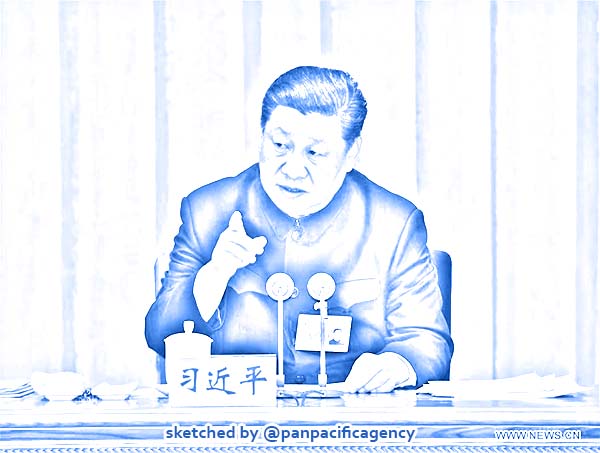China’s economy will prove resilient in long-term despite coronavirus impact, President Xi Jinping insists

Chinese President Xi Jinping, also general secretary of the Communist Party of China (CPC) Central Committee and chairman of the Central Military Commission (CMC), delivers a speech at a CMC meeting held in Beijing, capital of China, Jan. 4, 2019. (Xinhua/Li Gang). Sketched by the Pan Pacific Agency.
BEIJING, May 24, 2020, SCMP. Chinese President Xi Jinping has said the country’s economy will prove resilient in the long term, arguing that it will stand on the right side of history amid the rise of protectionism, South China Morning Post reported.
Xi was speaking after China’s economy suffered its heaviest blow in decades as a result of the Covid-19 pandemic and the rapid slowdown in the world economy.
China’s economy contracted by 6.8 per cent in the first quarter and the International Monetary Fund has projected that the global economy will shrink by 3 per cent this year, making it the worst recession since the Great Depression in the 1930s.
Xi made the comments during a panel discussion with delegates from the economic sector of the Chinese People’s Political Consultative Conference (CPPCC) on Saturday.
He pointed to the advantages China’s economy enjoyed, according to state news agency Xinhua, saying: “Our country has the world’s most comprehensive and the largest scale of industrial ecosystem, with a strong manufacturing capability… [We] have over 100 million businesses, over 170 million educated and trained workers and more than 400 million middle-income earners, making up a huge domestic consumption market in a country of 1.4 billion people.
“Facing the future, we must treat internal demand as the starting point and foothold as we accelerate the building of a complete domestic consumption system, and greatly promote innovation in science, technology and other areas.”
Xi also told delegates that China was on the cusp of rapid urbanisation, while e-commerce and other sectors that would provide new growth points, such as biotechnology, were on course for fast-track development.
The annual meetings of the CPPCC and the National People’s Congress, known as the “two sessions”, are mostly rubber-stamp affairs which Beijing uses to make public its yearly economic agenda, growth targets and national budget.
However, this year’s meetings, which were delayed for two months because of the Covid-19 outbreak, offered an opportunity for the outside world to better understand what plans Beijing leaders have in place to cope with the pandemic and revive the economy.
Delivering his annual government work report on Friday, Premier Li Keqiang did not set a growth target for this year saying the country faced “great uncertainty regarding the Covid-19 pandemic and the world economic and trade environment.”
The disease, which first emerged in China late last year, has infected more than 5 million people and killed over 330,000 globally as of Saturday and also caused widespread economic damage.
In his comments on Saturday, Xi warned that China’s economy would face “serious downward pressures”.
“We will also face a world economy entering into deep recession, a sharp contraction of international trade and investment, turmoil in global financial markets, disruption to international exchanges, push backs over globalisation, protectionism and unilateralism that have become rampant in some countries, and increasing geopolitical risks,” the Chinese president said.
However, he said China must stand firm in defending an open and reciprocal world trading system.
“Although protectionism is currently on the rise around the world, we must stand on the right side of history [on this issue]” Xi said without identifying any countries by name.
“We must insist on multilateralism and democratisation in international relations, and pursue development with an attitude [that emphasises] openness, cooperation, and benefits for all,” he said, stressing the importance of maintaining the stability of global supply chains.
US president Donald Trump, who is running for re-election in November, has been vocal in blaming China for the pandemic and his administration has claimed, without providing evidence, that the virus came from a laboratory in Wuhan.
The US state of Missouri as well as businesses and individuals in America have also started legal action against China, the Chinese Communist Party, the health authorities and others, seeking reparations.